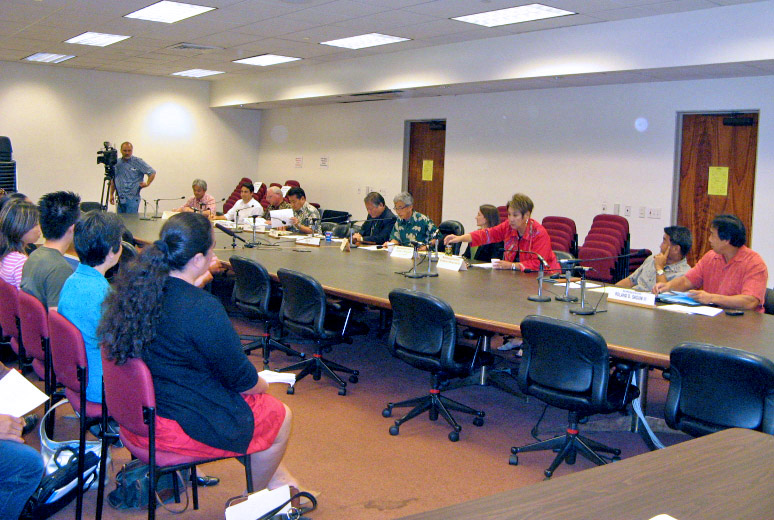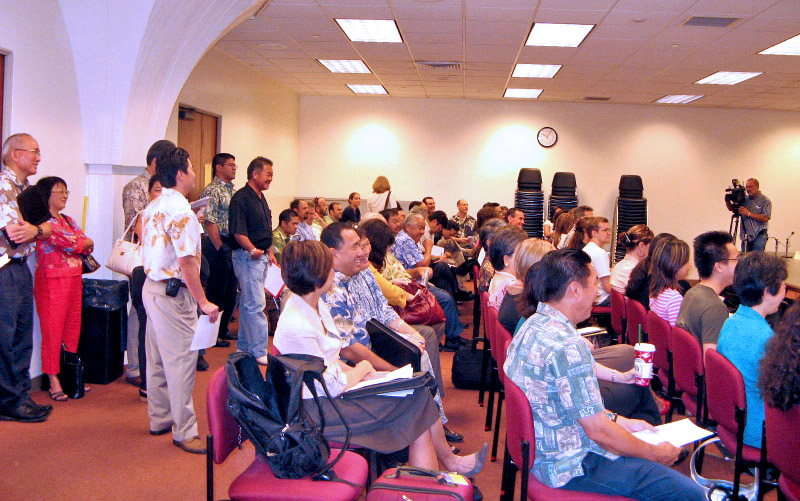Hawai‘i’s farmers are in trouble. There was an informational meeting of the House Agriculture, Water, Land and Ocean Committees Friday, and several of us testified. A post about it on the House of Representatives blog is titled The Rodney Dangerfield of the Economy and refers to how agriculture “doesn’t get any respect.”

This informational meeting came about after I gave a short speech at the Farm Bureau convention in October. Everybody’s business was in trouble but nobody wanted to talk. It’s local style to keep quiet, be reticent and not complain. I told the farmers in attendance that I knew they were having a hard time and that they should not have to suffer in silence.
I said, “You shouldn’t feel like you have to make an excuse. In fact, you shouldn’t have to shoulder the whole burden yourself.”
Shortly after that, Mae Nakahata, Vice President of the Farm Bureau, called me and said that some of the farmers she knew were in serious financial trouble. She then started the ball rolling to do something to help farmers. She was the driving force behind Friday’s informational meeting of the legislators.

Although we are considered large farmers, I do not think it’s prudent to depend on a few large farms. I am also very concerned about the idea that any of Hawai‘i farmers may be hiring illegal foreign workers. This video clip shows two O‘ahu farm managers being led away in handcuffs.
This is very disappointing because while this was going on, a lot of us were down at the Capitol testifying that farmers were in trouble. In an earlier informal survey, the farm in those news articles was understood to be one of only a few farms that was doing well. But if the stories are true and that farm was doing well because of illegal activity, this is not healthy for our state agricultural industry.
I don’t think we should be relying on foreign labor in this day and age, with what’s happening to our economy (which we know will get worse before it gets better). It’s not sustainable, and more importantly we should have local people working on our farms. We can accomplish this by diversifying geographically – so that our farms are where the people, and the resources, are.
I testified Friday that it’s not rocket science. The world has changed forever, but “if farmers make money, farmers will farm.” Farmers got in trouble earlier this year when oil prices spiked, which was only a sneak preview of what’s yet to come.
And if we have not prepared before it happens again, as we know it will, it could be disastrous for agriculture and for Hawai‘i’s food security.
We have an opportunity in the recent energy agreement between the state, HEI and the Consumer Advocate.
The legislature should add an extra incentive to farmers when the feed-in-tariff is in place by July. Besides helping farmers make money, using cutting edge technology may get the attention of younger people. No one wants to get into a business just to watch plants grow. We need action to interest the next generation. Alternate energy projects and their possibilities could provide an extra spark, especially if combined with the chance of making money.
This idea has the possibility of diversifying our food production – to farmers large and small, on all islands, at all elevations and both of the dry side and wet side of the islands. (I always say this when talking about the future of Hawai‘i’s agriculture.)
We need small farms expanding. We do not need large farms just getting bigger and bigger and gobbling up smaller farms.
Chef Alan Wong testified, too, as a restaurateur who uses local farm products in part so visitors can “taste Hawai‘i.”
Last year, a legislator tried to convince me that the card check bill – a bill that made it easier for workers to form unions – was necessary because there were abuses that I did not know of. I was not convinced.
I have changed my mind about the labor union card check bill. I feel that farms that treat their workers well should have no problems.
